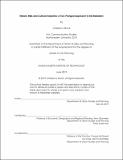Historic mills and cultural industries : a two-pronged approach to revitalization
Author(s)
Bruck, Chelsea S.(Chelsea Shibley)
Download1140385854-MIT.pdf (1.511Mb)
Other Contributors
Massachusetts Institute of Technology. Department of Urban Studies and Planning.
Advisor
Amy Glasmeier.
Terms of use
Metadata
Show full item recordAbstract
Decades past deindustrialization, former industrial centers across Massachusetts are committed to preserving and transforming historic mills. A variety of adaptive reuse projects spearheaded by cities and redevelopers alike have contribute anew to the area's diminished economy. Yet many mill towns and cities are still grappling with the question of how, exactly, to reanimate these massive buildings. At the same time, arts and culture-related strategies for economic development have continued to gain ground both locally and abroad. While artists have been known to gravitate towards deteriorating industrial building stock for its relative affordability and unique physical characteristics, planners and policy makers can also strategically support the development and sustainability of cultural facilities in historic mills as part of culture-led regeneration efforts. This thesis addresses the relationship between historic preservation and the cultivation of cultural industries. Drawing upon six case studies of arts and cultureƯfocused adaptive reuse in Lowell and Lawrence, Massachusetts, this study identifies the variety of challenges mill redevelopers face in creating cultural facilities and the range of strategies they deploy to achieve success. It also addresses the role of local government as a critical supporter of these types of projects, and derives lessons for city officials, developers, and other local stakeholders on how to advance the complementary goals of historic preservation, support of cultural industries, and economic and community revitaiization. This paper argues that the adaptive reuse of historic mills and cultural industry development are complementary strategies for economic and community revitalization that city officials should actively pursue by establishing plans, policies, and programs to facilitate the redevelopment of these industrial and historic landmarks.
Description
This electronic version was submitted by the student author. The certified thesis is available in the Institute Archives and Special Collections. Thesis: M.C.P., Massachusetts Institute of Technology, Department of Urban Studies and Planning, 2019 Cataloged from student-submitted PDF version of thesis. Vita. Includes bibliographical references (pages 91-99).
Date issued
2019Department
Massachusetts Institute of Technology. Department of Urban Studies and PlanningPublisher
Massachusetts Institute of Technology
Keywords
Urban Studies and Planning.